from Jul. 1, 1865
Phoebe Cary Poem on Lincoln's Death
-
Full Title
Phoebe Cary Poem on Lincoln's Death
-
Description
Philadelphia publishing house J.B. Lippincott & Co. compiled poetical tributes to President Lincoln in the months after his assassination. This piece, by Phoebe Cary, talks about how the mood of the country has changed from happiness for the end of the war to sadness for Lincoln's death. She goes on to describe his mercy and considerate leadership. Phoebe Cary was a well known poet and suffragette from Ohio. Later in life she moved to New York with her sister, Alice Cary, who was also a poet. During her lifetime she published two volumes of her own work.
-
Source
University of Wisconsin - Madison, Digitized by Google
-
Rights
This item is in the public domain and may be reproduced and used for any purpose, including research, teaching, private study, publication, broadcast or commercial use, with proper citation and attribution.
-
Tags
-
Cite this Item
Pheobe Cary. "Phoebe Cary Poem on Lincoln's Death". J.B. Lippincott & Co.. Remembering Lincoln. Web. Accessed May 25, 2025. https://rememberinglincoln.fords.org/node/1102
-
Creator
Pheobe Cary
-
Publisher
J.B. Lippincott & Co.
-
Date
1865
from Jul. 1, 1865
Phoebe Cary Poem on Lincoln's Death
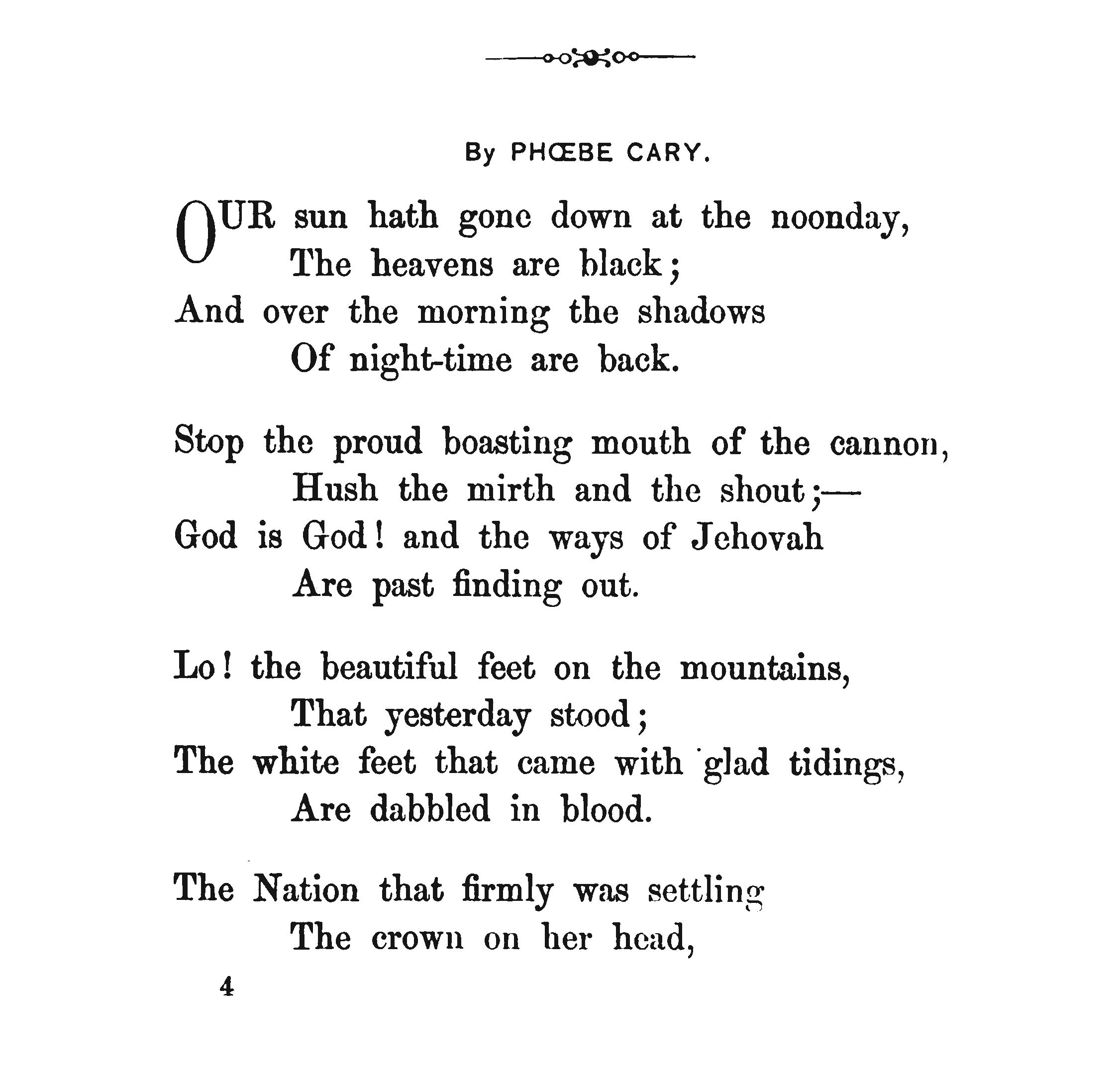
-
Description
Philadelphia publishing house J.B. Lippincott & Co. compiled poetical tributes to President Lincoln in the months after his assassination. This piece, by Phoebe Cary, talks about how the mood of the country has changed from happiness for the end of the war to sadness for Lincoln's death. She goes on to describe his mercy and considerate leadership. Phoebe Cary was a well known poet and suffragette from Ohio. Later in life she moved to New York with her sister, Alice Cary, who was also a poet. During her lifetime she published two volumes of her own work.
-
Source
University of Wisconsin - Madison, Digitized by Google
-
Rights
This item is in the public domain and may be reproduced and used for any purpose, including research, teaching, private study, publication, broadcast or commercial use, with proper citation and attribution.
-
Creator
Pheobe Cary
-
Publisher
J.B. Lippincott & Co.
-
Date
July 1, 1865
from Jul. 1, 1865
Julia Ward Howe Poem
-
Full Title
Poetical Tribute to President Lincoln - Julia Ward Howe
-
Description
Philadelphia publishing house J.B. Lippincott & Co. compiled poetical tributes to President Lincoln in the months after his assassination. This piece, by Julia Ward Howe, talks about Lincoln's legacy and how to honor him and his contributions to the nation. Julia Ward Howe was an abolitionist, suffragette and author, most famous for writing "The Battle Hymn of the Republic," which is now one of the most famous songs of the Civil War. She was inspired to write the song after meeting with President Lincoln at the White House in November 1861.
-
Source
University of Wisconsin - Madison, Digitized by Google
-
Rights
This item is in the public domain and may be reproduced and used for any purpose, including research, teaching, private study, publication, broadcast or commercial use, with proper citation and attribution.
-
Tags
-
Cite this Item
Julia Ward Howe. "Poetical Tribute to President Lincoln - Julia Ward Howe". J.B. Lippincott & Co.. Remembering Lincoln. Web. Accessed May 25, 2025. https://rememberinglincoln.fords.org/node/1100
-
Creator
Julia Ward Howe
-
Publisher
J.B. Lippincott & Co.
-
Date
1865
from Jul. 1, 1865
Poetical Tribute to President Lincoln - Julia Ward Howe
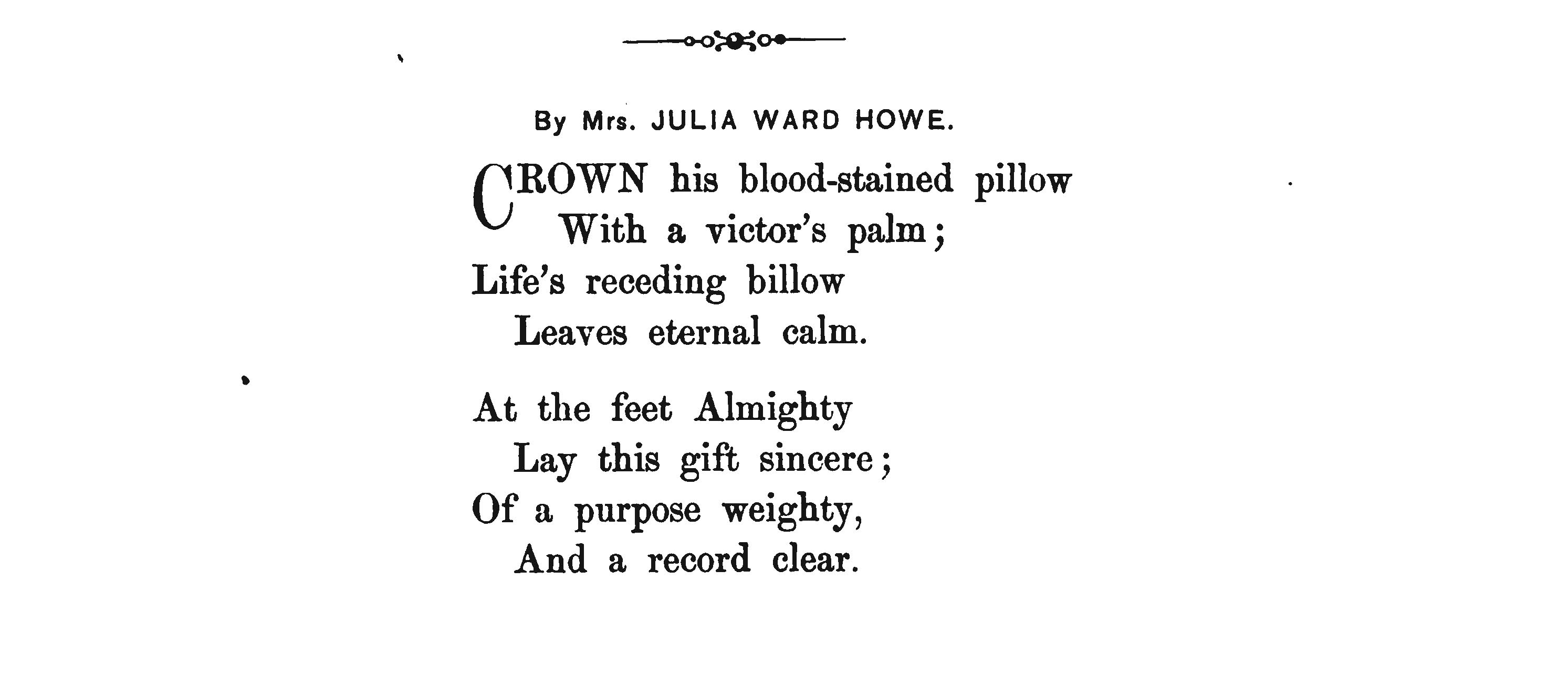
-
Description
Philadelphia publishing house J.B. Lippincott & Co. compiled poetical tributes to President Lincoln in the months after his assassination. This piece, by Julia Ward Howe, talks about Lincoln's legacy and how to honor him and his contributions to the nation. Julia Ward Howe was an abolitionist, suffragette and author, most famous for writing "The Battle Hymn of the Republic," which is now one of the most famous songs of the Civil War. She was inspired to write the song after meeting with President Lincoln at the White House in November 1861.
-
Source
University of Wisconsin - Madison, Digitized by Google
-
Rights
This item is in the public domain and may be reproduced and used for any purpose, including research, teaching, private study, publication, broadcast or commercial use, with proper citation and attribution.
-
Creator
Julia Ward Howe
-
Publisher
J.B. Lippincott & Co.
-
Date
July 1, 1865
from Jan. 1, 1929
"Long, Long Ago" by Clara Clough Lenroot
-
Full Title
"Long, Long Ago" - Memoir of Clara Clough Lenroot, Childhood in Wisconsin
-
Description
Born in 1857, Clara Clough Lenroot was less than 10 years old when President Lincoln was assassinated. This excerpt, from her memoir "Long, Long Ago" published in 1929, highlights her family's reaction to the news as they were moving to their new home in the wilderness outside of Osceola Mills, Wisconsin. Her father, Solon H. Clough, was a lawyer from Fulton, New York who hoped to find fortune out West in the early 1860s. Later in life, Clara married Irvine Lenroot who served in the U.S. House of Representatives from 1909 to 1918 and in the U.S. Senate from 1918 to 1927. Throughout the 1930s their daughter Katharine fought to regulate child labor laws and successfully lobbied for the Fair Labor Standards Act of 1938, which also established a national minimum wage. Katharine also served as third Chief of the United States Children's Bureau.
-
Transcription
In April of that year we moved over to our own farm, about a mile away, and about two miles away from the village of Osceola. I recall one interesting incident of the day on which we took possession of the farm. It was April, 1865. We were driving to our new home. Arriving at a little brook, father drove the horse into the stream to water him. As we waited a man came along on horseback, drew rein on the bridge, and beckoned to father. He drove through the stream, got out of the buggy and approached the man, who spoke a few words to him in a low, earnest voice. Father uttered an exclamation of dismay, and came back and told Mother the astounding news that Lincoln had been assassinated! So was that tremendous news transmitted to us, undoubtedly two or three days after its occurrence, as we had no telegraphic communication. The dreadful news permeated slowly by some such means as it came to us to the remotest parts of the country.
We rode on in silence. We little girls sensed the fact that calamity had overtaken our world. We were hushed by the sorrow in our parents’ faces, and asked no questions. In sad silence we approached the farmhouse that was to be our home, an event which we had anticipated with tremendous excitement and curiosity. Arrived at the little home, father and mother made some pretence of arranging the household goods, but mother soon seated herself upon a bench outside the kitchen door, and tears ran down her face. Father came and sat beside her, wiping his own eyes, and took her hand in his. We children stood around, more and more impressed by their grief. Little was done towards settling the new home that day.
(In sharp contrast to the slow progress of the news of Lincoln’s assassination came the news of President Harding’s death in 1923 to a rural camp in the midst of the pine forest. There a radio set had been installed. Mrs. Claude Luse, alone in her camp near Gordon, Wisconsin, children and maid in bed, was listening to a fine concert being radioed from the Drake Hotel in Chicago. A singer had just begun a solo. She had sung but a few words when the music stopped and a voice said, “We have just had word that President Harding died in San Francisco ten minutes ago; stand by for confirmation.” In a few seconds the statement was confirmed. Mrs. Luse’s neighbor, Mr. Gallaher, starting to town early the next morning, carried the news with him along the route.)
[Transcription by: Kyra S., Dr. Susan Corbesero’s Class, Ellis School, Pittsburgh, Pennsylvania] -
Source
Library of Congress, General Collections and Rare Book and Special Collections Division
-
Rights
The written permission of the copyright owners and/or other rights holders (such as publicity and/or privacy rights) is required for distribution, reproduction, or other use of protected items beyond that allowed by fair use or other statutory exemptions.
-
Tags
-
Cite this Item
Clara Clough Lenroot. ""Long, Long Ago" - Memoir of Clara Clough Lenroot, Childhood in Wisconsin". Badger Printing Company. Remembering Lincoln. Web. Accessed May 25, 2025. https://rememberinglincoln.fords.org/node/1092
-
Creator
Clara Clough Lenroot
-
Publisher
Badger Printing Company
-
Date
1929
-
Dimensions
24 cm.
from Jan. 1, 1929
"Long, Long Ago" - Memoir of Clara Clough Lenroot, Childhood in Wisconsin
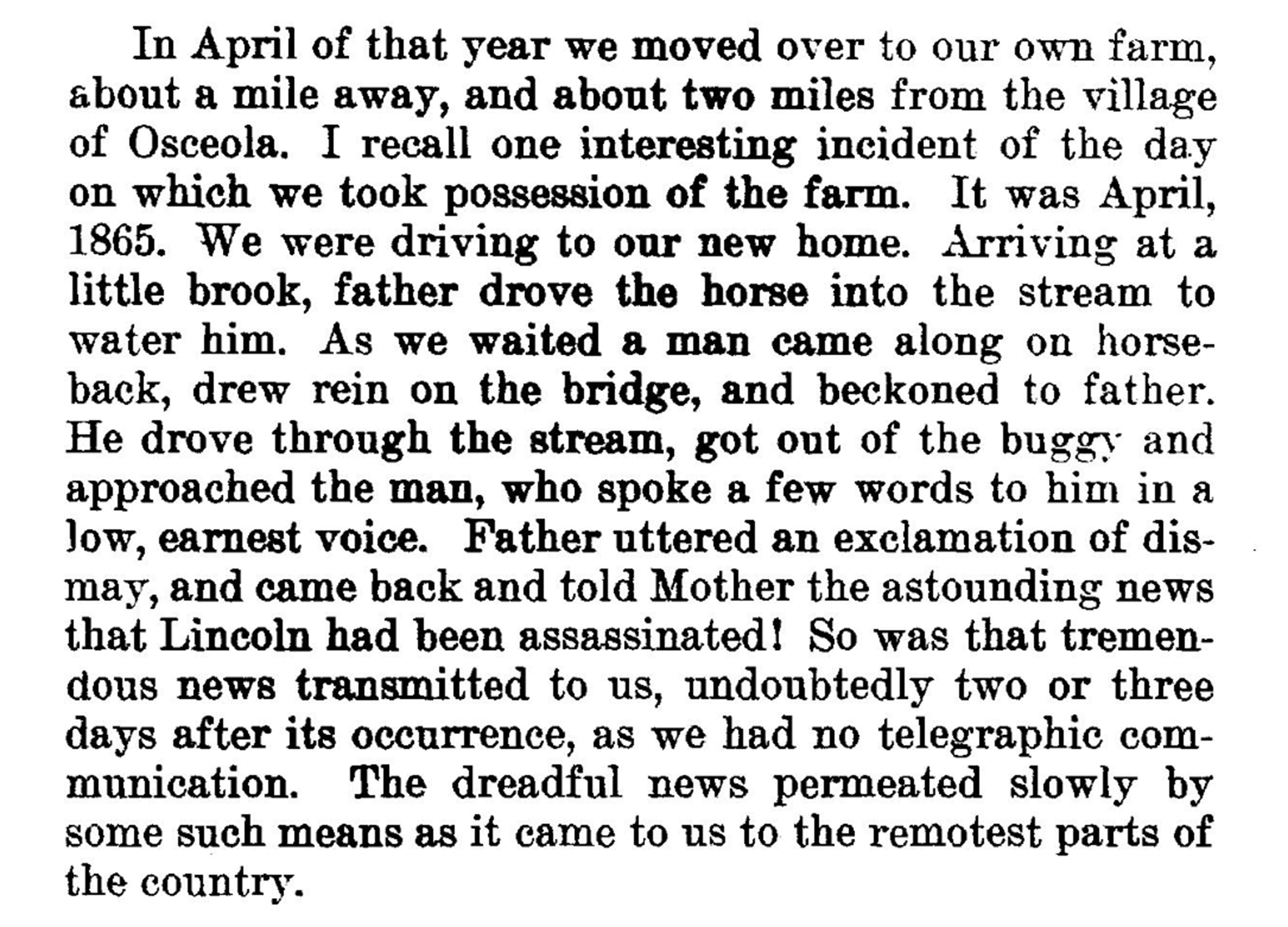
-
Description
Born in 1857, Clara Clough Lenroot was less than 10 years old when President Lincoln was assassinated. This excerpt, from her memoir "Long, Long Ago" published in 1929, highlights her family's reaction to the news as they were moving to their new home in the wilderness outside of Osceola Mills, Wisconsin. Her father, Solon H. Clough, was a lawyer from Fulton, New York who hoped to find fortune out West in the early 1860s. Later in life, Clara married Irvine Lenroot who served in the U.S. House of Representatives from 1909 to 1918 and in the U.S. Senate from 1918 to 1927. Throughout the 1930s their daughter Katharine fought to regulate child labor laws and successfully lobbied for the Fair Labor Standards Act of 1938, which also established a national minimum wage. Katharine also served as third Chief of the United States Children's Bureau.
-
Source
Library of Congress, General Collections and Rare Book and Special Collections Division
-
Rights
The written permission of the copyright owners and/or other rights holders (such as publicity and/or privacy rights) is required for distribution, reproduction, or other use of protected items beyond that allowed by fair use or other statutory exemptions.
-
Creator
Clara Clough Lenroot
-
Publisher
Badger Printing Company
-
Date
January 1, 1929
-
Dimensions
24 cm.
from Apr. 28, 1865
Lincoln Assassination, April 28th, 1865
-
Full Title
El Nuevo Mundo: Lincoln Assassination, April 28th, 1865
-
Description
El Nuevo Mundo [The New World], was a Spanish tri-weekly newspaper dedicated to the interest of Republicanism in the Americas; copies were circulated throughout California, Mexico, Central America, and South America. In this issue, the newspaper included an illustration and an account from an eyewitness of the assassination of Lincoln in the Ford Theatre. Taking place two weeks after the assassination, El Nuevo Mundo reporters attended a Mexican Patriotic Club meeting in Virginia, Nevada. The President of the club gave a speech, expressing a thirst for justice and the fall of the Confederacy. The Society of Patriotic Women of Virginia City was also in attendance at the meeting in junction with the men of the Mexican Patriotic Club, whose president also gave a speech in front of the entire body. In a slightly altered manner, she spoke of not merely a hopeful defeat of the Confederates, but of return to union.
-
Transcription
“The Lady Harris, who was in the box with the president, gives the following account: The assassin entered in the box, and Major Rathburn [Henry Rathbone] got up and asked the intruder what business had him there. Without answering he ran inside, and placed the gun to the head of the president, fired, and in that instant he jumped onto the balustrade of the box and made a threatening motion with a dagger he carried, pointed at the face or chest of Mr. Lincoln… Major Rathburn [Rathbone] jumped forward to protect the president, grabbed the assassin by the end of his frock and was stabbed in the arm. The assassin then jumped onto the stage and fled – Dispatch of the associated press”
-
Source
Newsbank
-
Rights
Use of this item for research, teaching, and private study is permitted with proper citation and attribution. Reproduction of this item for publication, broadcast, or commercial use requires written permission.
-
Tags
-
Cite this Item
El Nuevo Mundo. "El Nuevo Mundo: Lincoln Assassination, April 28th, 1865 ". El Nuevo Mundo. Remembering Lincoln. Web. Accessed May 25, 2025. https://rememberinglincoln.fords.org/node/1090
from Apr. 28, 1865
El Nuevo Mundo: Lincoln Assassination, April 28th, 1865
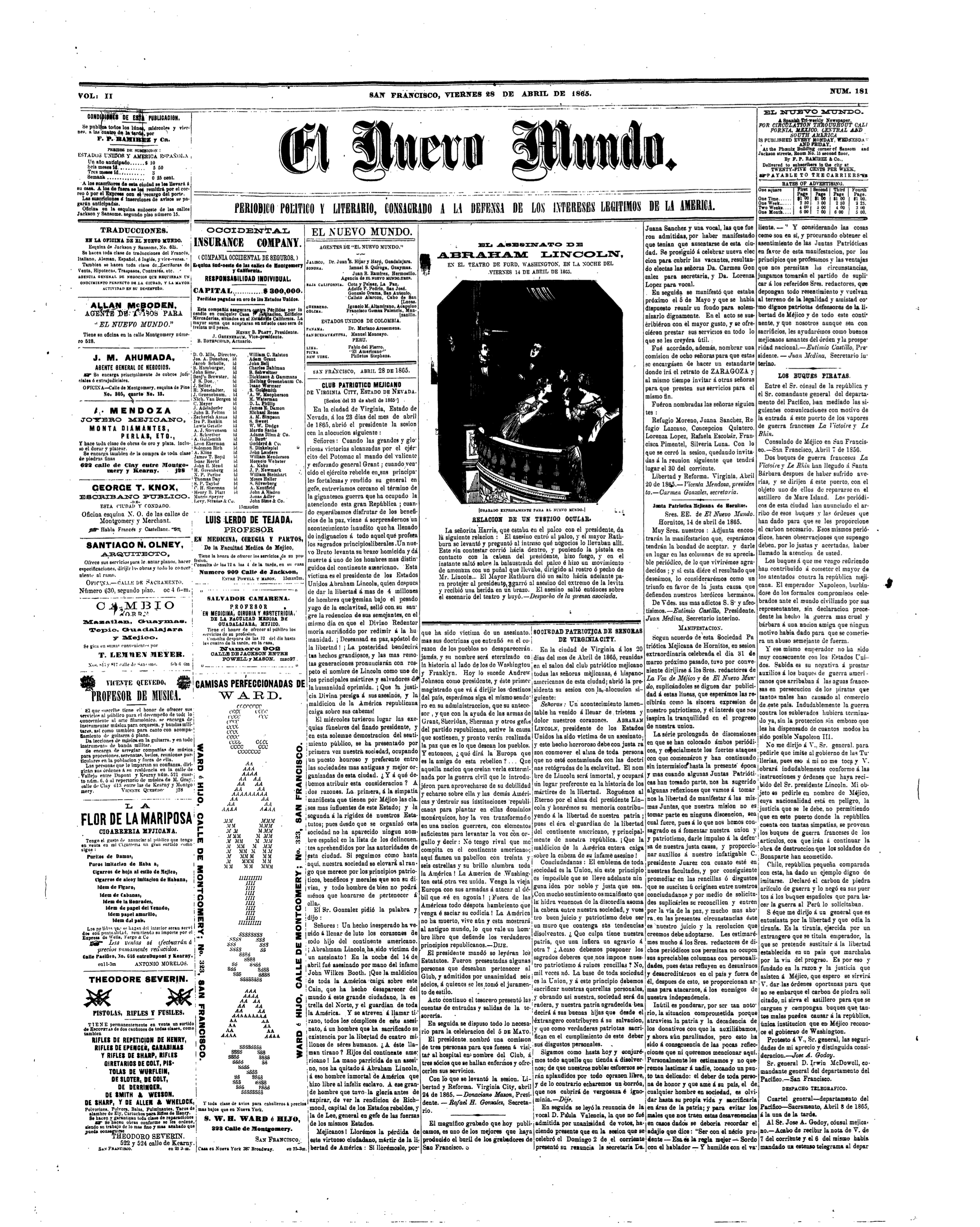
-
Description
El Nuevo Mundo [The New World], was a Spanish tri-weekly newspaper dedicated to the interest of Republicanism in the Americas; copies were circulated throughout California, Mexico, Central America, and South America. In this issue, the newspaper included an illustration and an account from an eyewitness of the assassination of Lincoln in the Ford Theatre. Taking place two weeks after the assassination, El Nuevo Mundo reporters attended a Mexican Patriotic Club meeting in Virginia, Nevada. The President of the club gave a speech, expressing a thirst for justice and the fall of the Confederacy. The Society of Patriotic Women of Virginia City was also in attendance at the meeting in junction with the men of the Mexican Patriotic Club, whose president also gave a speech in front of the entire body. In a slightly altered manner, she spoke of not merely a hopeful defeat of the Confederates, but of return to union.
-
Source
Newsbank
-
Rights
Use of this item for research, teaching, and private study is permitted with proper citation and attribution. Reproduction of this item for publication, broadcast, or commercial use requires written permission.
-
Creator
El Nuevo Mundo
-
Publisher
El Nuevo Mundo
-
Date
April 28, 1865
-
Material
newspaper
from May. 1, 1866
Funeral Dirge of President Lincoln
-
Full Title
Funeral Dirge of President Lincoln
-
Description
Funeral dirge composed in honor of Abraham Lincoln's funeral. Composed for solo piano. Part of the Library of Congress Civil War Sheet Music Collection.
-
Source
-
Rights
Public Domain. Suggested credit line: Civil War Sheet Music Collection, Library of Congress, Music Division.
-
Tags
-
Cite this Item
Rynder, Rose. "Funeral Dirge of President Lincoln". Philadelphia: Marsh & Bubna, 1866. Remembering Lincoln. Web. Accessed May 25, 2025. https://rememberinglincoln.fords.org/node/1023
from May. 1, 1866
Funeral Dirge of President Lincoln

-
Description
Funeral dirge composed in honor of Abraham Lincoln's funeral. Composed for solo piano. Part of the Library of Congress Civil War Sheet Music Collection.
-
Source
-
Rights
Public Domain. Suggested credit line: Civil War Sheet Music Collection, Library of Congress, Music Division.
-
Creator
Rynder, Rose
-
Publisher
Philadelphia: Marsh & Bubna, 1866
-
Date
May 1, 1866
from May. 1, 1865
Lincoln's requiem
-
Full Title
Lincoln's requiem
-
Description
Lincoln's requiem was composed for chorus (mixed voices, 4 parts) and piano. Associated with the Union side, the song mourns President Lincoln's death and praises his legacy as an advocate for freedom and liberty. The lyrics consist of five verses and a refrain. Part of the Library of Congress Civil War Sheet Music Collection.
-
Transcription
Verse:
Dead! dead! how swift the dire news flies,
And wakes a nation's agonies!
From town to town, from mouth to mouth
Swift spreads the dreaded message forth;
In lowly cot, in lordly hall,
This grief enshrouds and covers all.
And on the breast drops ev'ry head,
In sorrow for the noble dead.
Chorus:
Oh, weep for fallen greatness! weep!
Let tears express our woes;
But while our Lincoln's soul doth sleep,
Brave men strike down his foes!
Verse:
Dead! dead! but not as warriors die,
He fell not shouting battle cry--
Not in the open light of heavn'--
Not in his home his soul was risen--
Not on the plain where hand to hand
The brave cross blade with foemen's brand,
But where the waves of pleasure flow,
Death aim'd his shaft thro' secret foe. [Chorus]
Verse:
Dead! dead! and now when hopes were high,
And wars dread curse was passing by,
When traitors had their madness stay'd,
And hero hands sheathed vegeful blade,
When homes and hearthstones gleamd afar,
To manly hearts grown tired of war,
And long wooed peace had left the sky,
It was no time for him to die. [Chorus]
Verse:
Dead! dead! and when the millions free
Sent up their shouts of liberty,
When from the depths of bondage wrung,
Sweet freedoms song, by freedmen sung,
When million hearts their thanks out pour'd
And angel ears in pleasure heard,
When words his hand has trac'd live on
It is not meet to mourn him gone. [Chorus]
Verse:
Dead! dead! and has he died in vain?
Shall we in lethargy remain?
His years of patriot toil forget
Shall unavenged his life sun set?
No! for this blow in treach'ry given,
The smoke of strife shall rise to heav'n,
And 'till our flag in triumph waves
His foes and ours find bloody graves! [Chorus]
-
Source
-
Rights
Public Domain. Suggested credit: Civil War Sheet Music Collection, Library of Congress, Music Division.
-
Tags
-
Cite this Item
Butterfield, J. A. (composer); Boynton, Irene (lyricist). "Lincoln's requiem". Chicago: H. M. Higgins, 1865. Remembering Lincoln. Web. Accessed May 25, 2025. https://rememberinglincoln.fords.org/node/1021
from May. 1, 1865
Lincoln's requiem

-
Description
Lincoln's requiem was composed for chorus (mixed voices, 4 parts) and piano. Associated with the Union side, the song mourns President Lincoln's death and praises his legacy as an advocate for freedom and liberty. The lyrics consist of five verses and a refrain. Part of the Library of Congress Civil War Sheet Music Collection.
-
Source
-
Rights
Public Domain. Suggested credit: Civil War Sheet Music Collection, Library of Congress, Music Division.
-
Creator
Butterfield, J. A. (composer); Boynton, Irene (lyricist)
-
Publisher
Chicago: H. M. Higgins, 1865
-
Date
May 1, 1865
from May. 1, 1866
In memoriam, A. Lincoln
-
Full Title
In memoriam, A. Lincoln
-
Description
"In memoriam, A Lincoln" was composed by Gertrude I. Ladd. The ballad is set for voice and piano in English. It contains two verses of lyrics that discuss President Lincoln's assassination as a sacrifice for freedom in the United States. Part of the Library of Congress Civil War Sheet Music Collection.
-
Transcription
Within the nations heart today,
In honor brightly set,
There lives a cherish'd memory
That buddeth greenly yet
And ever will time cannot change
The love which death has made
Sacred to all, yet to become
The people's heritage.
But words are ever weak for praise,
There is no need to dwell
Upon the strong and tender heart
That all could read so well;
Always for worthy victories won
Is paid a costly price,
Then freedom at her need has had
A worthy sacrafice.
-
Source
-
Rights
Public Domain. Suggested credit line: Civil War Sheet Music Collection, Library of Congress, Music Division.
-
Tags
-
Cite this Item
Ladd, Gertrude I. . "In memoriam, A. Lincoln". New York: C. M. Tremaine, 1866. Remembering Lincoln. Web. Accessed May 25, 2025. https://rememberinglincoln.fords.org/node/1020
from May. 1, 1866
In memoriam, A. Lincoln
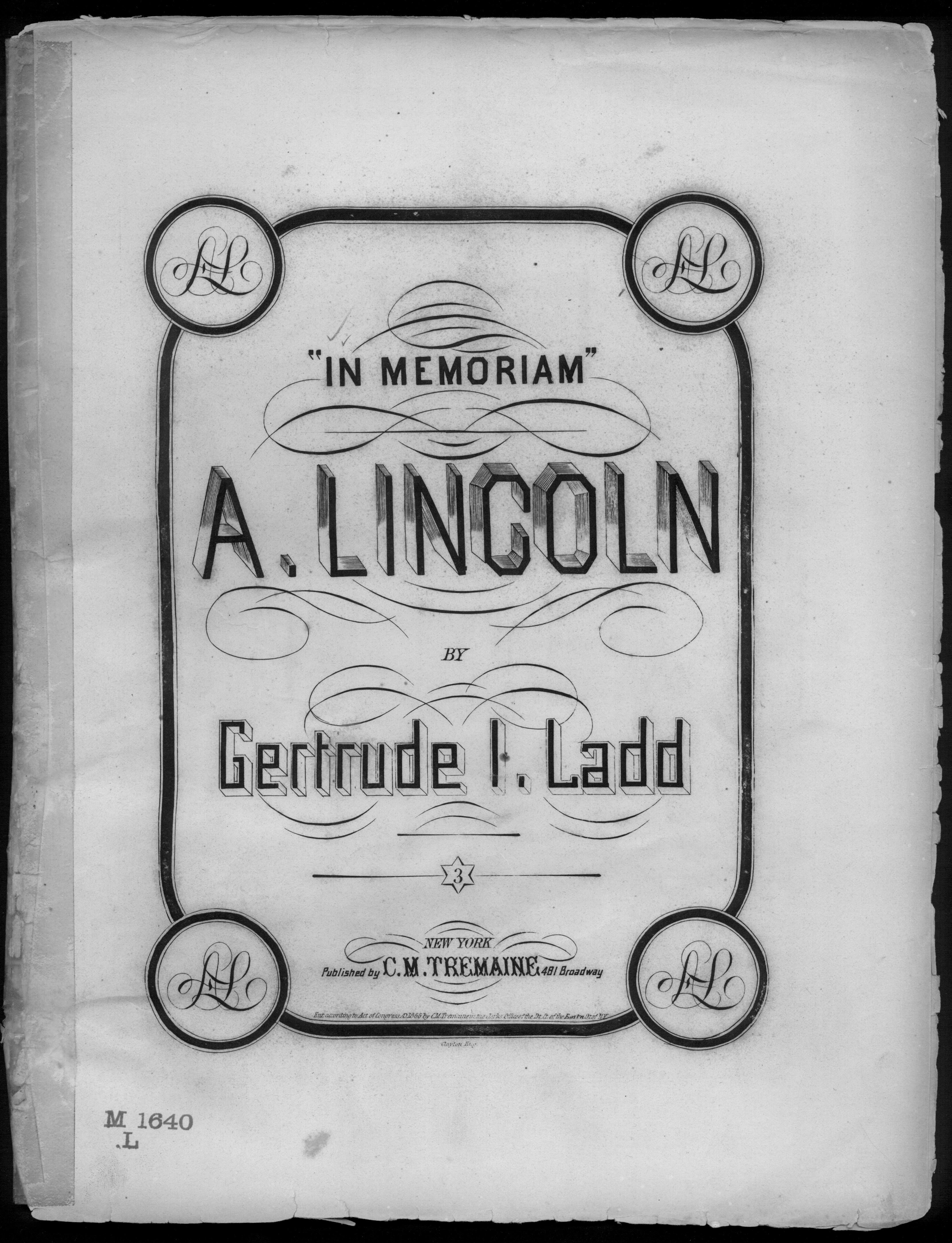
-
Description
"In memoriam, A Lincoln" was composed by Gertrude I. Ladd. The ballad is set for voice and piano in English. It contains two verses of lyrics that discuss President Lincoln's assassination as a sacrifice for freedom in the United States. Part of the Library of Congress Civil War Sheet Music Collection.
-
Source
-
Rights
Public Domain. Suggested credit line: Civil War Sheet Music Collection, Library of Congress, Music Division.
-
Creator
Ladd, Gertrude I.
-
Publisher
New York: C. M. Tremaine, 1866
-
Date
May 1, 1866
-
Material
sheet music

